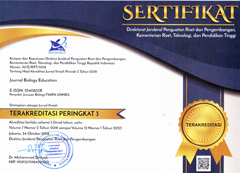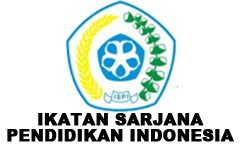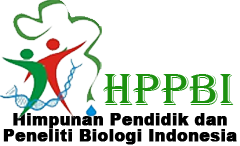PENGARUH MODEL THINK-PAIR-SHARE (TPS) TERINTEGRASI MIND MAPPING TERHADAP KREATIVITAS DAN HASIL BELAJAR SISWA
Abstract
Tujuan penelitian ini untuk mengetahui pengaruh penerapan model TPS terintegrasi Mind mapping terhadap kreativitas dan hasil belajar siswa materi Archaebacteria dan Eubacteria di MAN 2 Brebes pada semester ganjil tahun ajaran 2015/2016. Metode penelitian yang digunakan Quasi Experiment dengan desain Noneequivalent Control Group Pretest-Postest Design. Sampel penelitian yang digunakan adalah kelas X MIA 3 berjumlah 38 siswa sebagai kelas kontrol yang dan X MIA 4 berjumlah 32 siswa sebagai kelas eksperimen diambil dengan teknik Purposive Sampling. Prosedur penelitian meliputi tahap persiapan, pelaksanaan dan penyelesaian. Teknik pengumpulan data yang digunakan adalah metode observasi, tugas, tes, dan angket. Data kreativitas berupa hasil observasi dan hasil Mind mapping yang dibuat siswa. Hasil belajar kognitif diperoleh dari peningkatan nilai Pre-test dan Post-test. Hasil perhitungan kreativitas menunjukkan bahwa kelas eksperimen mencapai kriteria kreatif sedangkan kelas kontrol kurang kreatif. Analisis untuk mengetahui pengaruh model terhadap kreativitas dan hasil belajar dilakukan dengan uji Independent Samples t Test. Hasil uji t data kreativitas siswa menunjukan bahwa terdapat perbedaan yang signifikan antara kelas kontrol yang menggunakan model konvensional dengan kelas eksperimen yang menggunakan model TPS. N-Gain kedua kelas juga terbukti berbeda signifikan. Berdasarkan hasil pembahasan dapat disimpulkan bahwa penerapan model TPS terintegrasi Mind mapping berpengaruh terhadap kreativitas dan hasil belajar siswa materi Archaebacteria dan Eubacteria.
This research aimed to discover the effect of applyingTPS model integrated with Mind mapping to the students’ creativity and learning achievement inArchaebacteria and Eubacteria subject in MAN 2 Brebes in the first semester inthe academic year 2015/2016. It appliedthe Quasi Experiment with Noneequivalent Control Group Pretest-Postest Design. The sample of the researchused were38 students of X MIA 3 as the class control and 32 students of X MIA 4 as the experimental classby applying Purposive Sampling technique. The procedure of the research included the steps of preparing, conductingandfinishing. The technique to collect the data was done by observation, assignments, tests, and questionnaire. The data of creativity was presented as the observation result and Mind mapping resultmade by the students. The result of cognitive learning was gained by from the improvementon the score in Pre-test and Post-test. The result from the creativity counting shows thatthe experimental classachieves the criteria of creativitywhile class control is less creative. The analysis used for discovering the effect of the model to the students’ creativity and learning achievement is done by Independent samples t test. Based on the result of t test, the data of students’ creativity presents a significant difference between class control which applied conventional model and experimental class which applied TPS. Both of the classes’ N-Gain prove a significant difference. Based on the previous discussion, it can be concluded that the application of TPS model which is integrated with Mind mapping effects on the students’ creativity and learning achievement in Archaebacteria dan Eubacteria subject.
The copyright of the article once it is accepted for publication shall be assigned to the journal as the publisher. The intended copyright includes the right to publish the article in various forms (including reprints). The journal maintains the publishing rights to the published articles.
This work is licensed under a Creative Commons Attribution 4.0 International License.







